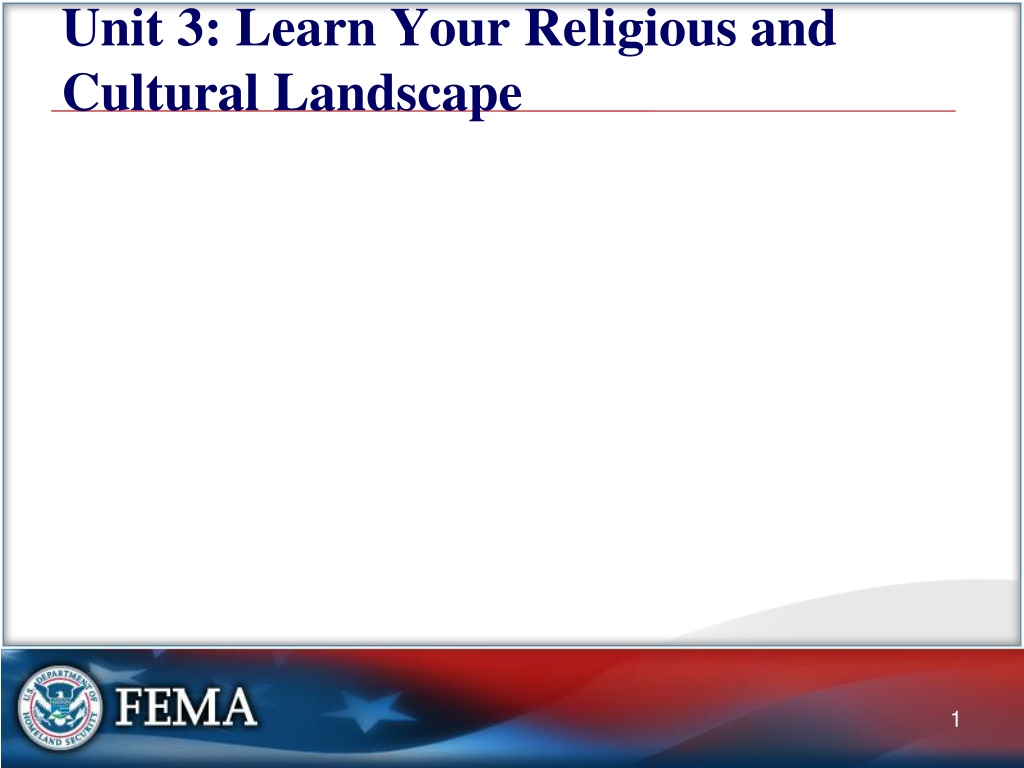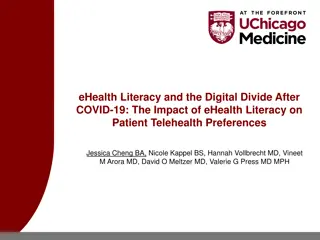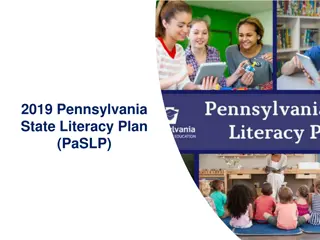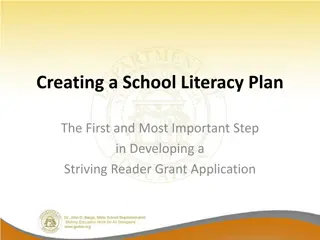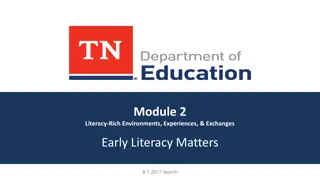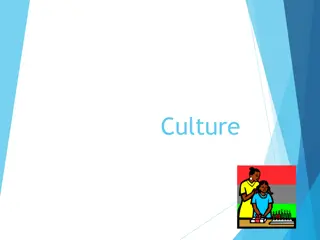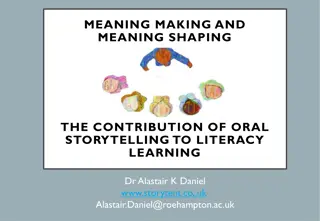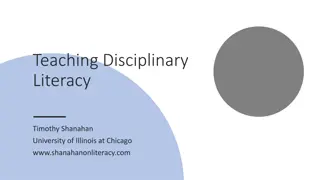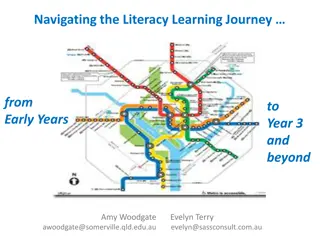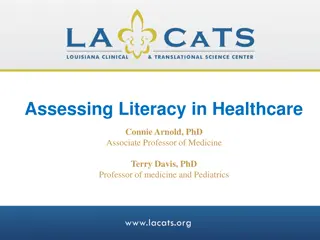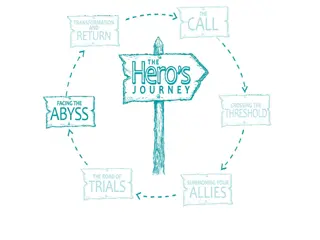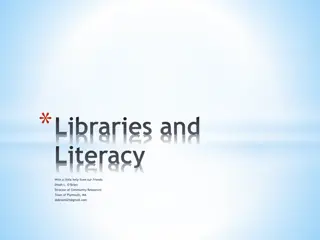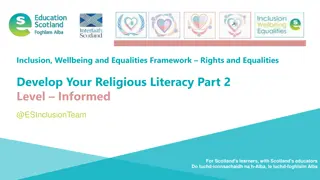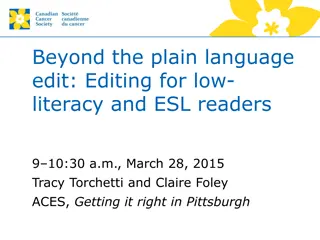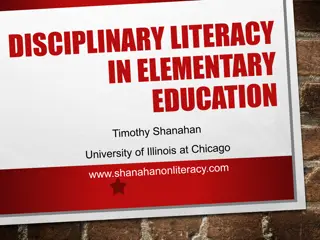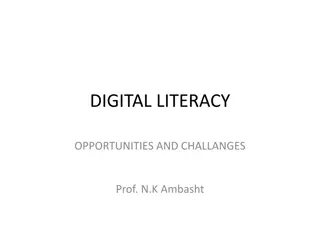Enhancing Religious and Cultural Literacy for Effective Engagement
Explore the importance of religious literacy and competency in engaging diverse communities during disasters. Learn how to differentiate between literacy and competency, understand the needs of partners, provide culturally appropriate services, and build sustainable relationships. Continuous learning and effective communication are key in improving literacy and competency. Share experiences and strategies for increasing your knowledge in this area.
Download Presentation

Please find below an Image/Link to download the presentation.
The content on the website is provided AS IS for your information and personal use only. It may not be sold, licensed, or shared on other websites without obtaining consent from the author. Download presentation by click this link. If you encounter any issues during the download, it is possible that the publisher has removed the file from their server.
E N D
Presentation Transcript
Unit 3: Learn Your Religious and Cultural Landscape 1
Objectives Upon completion of this lesson, you should be able to: Differentiate between literacy and competency Use the tip sheets in preparing for engagement with diverse groups 2
Literacy and Competency Religious literacy Basic understanding of multiple faith traditions Ability to understand the intersection of religious people and the larger communities they inhabit Religious competency Ability to navigate and engage each faith community as a trusted, knowledgeable, and effective partner in a disaster setting 3
Literacy and Competency (cont'd) Religious literacy is: Knowing and understanding the community where you work Understanding the needs, concerns and missions of your partners both locally and nationally 4
Literacy and Competency (cont'd) Religious competency is: Providing culturally and religiously appropriate disaster services Building relationships that are trustworthy and sustainable You will be using your literacy to help those in need and listen to what the needs are. 5
Literacy and Competency (cont'd) Knowledge will come from partnerships Religious competency isnt simply a static skill you cant learn it all and be done You will need to keep learning about different religions and cultures throughout your career In the community, make an effort to go out and learn what you need to know Consider different ways to communicate 6
Discussion - Literacy and Competency Can you think of any times where you have increased your religious and cultural literacy and/or competency? What did you do to increase your literacy and competency? Why did you do it? How did it help? 7
Educate Yourself on Local Faith Communities Contact your local emergency management department regarding existing faith community relationships Contact the State or Local faith community liaison in the offices of your Governor or Mayor Consider the types of data gathered by the congregations themselves and how this data can assist with ongoing reporting 8
Educate Yourself on Local Faith Communities (continued) There are additional resources from which you can obtain data regarding local faith communities. These include: Local or county Emergency Management Divisions (EMDs) Emergency management office partnerships coordinator Faith-based social service providers Designated state and local faith-based liaison offices 9
Educate Yourself on Local Faith Communities (continued) There are additional resources from which you can obtain data regarding local faith communities. These include: Designated county and city departments faith- based liaisons Interfaith centers and disaster interfaiths Networks, associations, conferences, religious denominations, and governing bodies Faith leaders 10
Educate Yourself on Local Faith Communities (continued) State/Regional Voluntary Agency Liaison (VAL) Assistance in identifying key groups Assistance in identifying existing partnerships VOADs Long-Term Recovery Organizations (LTROs) 11
Educate Yourself on Local Faith Communities (continued) DHS Center for Faith-based and Neighborhood Partnerships (DHS Center) Assistance compiling data on local faith communities Association of Statisticians of American Religious Bodies (ASARB) Provide county-level data regarding faith communities Religious Congregations and Membership Study Congregations for different religious traditions Adherents for religious traditions 12
Educate Yourself on Local Faith Communities (continued) Review the information received Leave any assumptions behind Language and cultural skills required might surprise you Most common country of origin other than Mexico Logistical considerations Language support Special dietary requirements 13
Educate Yourself on Local Faith Communities (continued) What faith communities are located in or serve the affected area? Determine the structure of these organizations Do they possess a top-down structure? Are their congregations autonomous? 14
Educate Yourself on Local Faith Communities (continued) Who are key religious leaders and communicators? What are their titles? Are they commissioned or lay? What networks and associations exist? What is the role and expertise of each organization? What other government agencies work with these communities? What connections to national affiliates exist? Which groups are not being included or likely to be missed? 15
Faith Community Engagement Tip Sheets Engagement Best Practices: Creating an Engagement Plan Cultural Competency Tips Resources and Tools Religious Leader Engagement Tip Sheets: Buddhist Christian Black Church Protestant Church of Jesus Christ of Latter-day Saints (Mormon) Evangelical Megachurch Latino Protestant Orthodox Christian Protestant Roman Catholic Hindu Jewish Muslim Sikh 16
An Important Principle to Remember As you begin to improve your religious and cultural literacy, it is important to understand the primary principle: If unsure, ASK. If you do not know or are unsure of something, remember to practice active listening and ask questions. It is better to ask than to make a mistake and offend those you are trying to help. 17
Humility and Compassion Come in humble, and you will always be invited back Have compassion - Those you engage with may have lost their homes and/or their loved ones 18
Discussion: Engagement Plan (Part 2) For this discussion, review the following sections: Gaining Literacy Religious Groups Questions: What tools or resources would you use to answer the questions in the Gaining Literacy and Religious Groups sections? Is there any other information you might include? 19
Lesson Summary You should now be able to: Differentiate between literacy and competency Use the tip sheets in preparing for engagement with diverse groups 20
